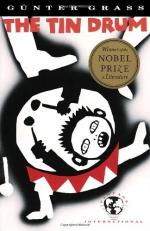|
|
The Tin Drum Topic Tracking: Individuality/Identity
Topic Tracking: Individuality/Identity
Chapter 1
Individuality 1: Oskar describes both his grandfather and the two policemen in completely impersonal terms: as "Short and Wide" and "Long and Thin."
Chapter 2
Individuality 2: Joseph Koljaiczek, Oskar's grandfather, assumes the identity of Joseph Wranka, a drowned raftsman, to escape charges of arson.
Chapter 3
Individuality 3: Oscar, instead of identifying with his father's wishes to follow him into mainstream society, chooses at the moment of his birth to identify with the drumming of the moth on the light bulb.
Individuality 4: Oscar begins with this quote to refer to himself interchangeably in either the first or third person, a motif that holds for the whole novel.
Chapter 7
Individuality 5: Oskar considers his two greatest theoretical influences to be Rasputin and Goethe: he creates a hybrid between the thinkers that plays their contrasting beliefs off one another. The uniting factor between the thinkers is their insistence on individuality - Goethe in an aloof, theoretical, romantic way and Rasputin in a more visceral, overtly subversive way.
Chapter 11
Individuality 6: There is a pervasive, internal tension that begins here and holds throughout the novel between Oskar and his relation to (and his identification with) the baby Jesus. At times Oskar says Jesus is his opposite (that the devil lives through him), and at other times he says he is the embodiment of Jesus himself. He spends time in the church of the Sacred Heart trying (and in time succeeding) to get the baby Jesus sculpture to play his drum.
Chapter 19
Individuality 7: During the German raid on the Polish Post Office, Jan, Oskar, and Koybella play skat. Jan, focusing his mind only on the game, begins to call Oskar Alfred and Koybella Agnes, and then vice versa.
Individuality 8: For the first time in the novel, Oskar calls Jan "Papa" at the skat game during the battle at the post office. He does not beat around the bush by calling him something like "my presumptive father."
Chapter 22
Individuality 9: Oskar spends a long time at the end of this chapter depersonalizing the experience of fathering his son Kurt with Maria. From this quote, both Oskar's conscious will and the identity of his son Kurt are thrown into question - no one knows who has acted in this situation.
Chapter 23
Individuality 10: In Paris with Roswitha, Oskar says the Eiffel tower caused them for the first time to become aware of their "grandeur and uniqueness." (Chapter 27, pg. 329)
Chapter 28
Individuality 11: This quote represents a new twist on the tension surrounding Oskar's identification with the baby Jesus. Oskar is continually trying to balance the forces that draw him to and repulse him away from, religion and this identification.
Chapter 32
Individuality 12: During Matzerath's funeral, Oskar owns up to killing his presumptive father with the Party pin because he "was sick of dragging a father around with him all his life." Chapter 32, pg. 404. He calls Matzerath his real father.
Individuality 13: By throwing his drum into Matzerath's grave, Oskar voluntarily begins to grow. He recognizes that he is older and he is now orphaned from all of his possible biological parents. Oskar eventually grows into a four foot, one inch hunchback, and loses the ability to break glass with his voice.
Chapter 34
Individuality 14: Bruno has caught Oskar in a way, for his credibility may be lacking. The truth of Oskar's relationships, and who he has described himself and his family to be, are called into question.
Chapter 36
Individuality 15: Here, Oskar's identity crisis takes on epic proportions; the events of the novel are assimilated into a Shakespearean question of being. Oskar identifies himself with Yorick, the dead former court jester in Hamlet, and the dead, piecemeal woman killed in the war, becomes Hamlet, the tragic hero.
Chapter 37
Individuality 16: Oskar has volunteered himself to be an art school model. He begins a long series of critiques on himself and the state of the world based on the representations of his physical form that various artists create.
Chapter 41:
Individuality 17: Oskar fails himself here, even as he thinks he knows the forces at work within him so well. The identification with the Devil is a pervasive motif, and, ostensibly, a reliable one for Oskar to fall back on. Even that fails him in his dealings with Sister Dorothea.
Chapter 42
Individuality 18: Individual guilt is pointed to the collective; perhaps the state of the collective conscience, the government, is as destructive as the lives of individuals. Just like Klepp's rebirth, the emphasis is on purity.




